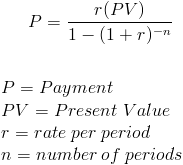Annuity
What is an Annuity?
An annuity plan is a type of pension or retirement plan structured for securing a consistent cash Income flow during your retirement period. It is an insurance plan where the income is paid at a regular interval of time in return for a lump sum amount that is paid upfront. You put money into the plan – be it immediate annuity or variable annuity – and as a result, the insurance company agrees to pay you a specified amount at regular intervals.

Such money is helpful during the later stages of your life when there are no regular paychecks. These pension plans ensure that you are self-sufficient in the twilight of your career and do not depend on anyone.
Annuity Formula
The formula is used to calculate the periodic payment of annuities:

Here P is the payment, PV – present value – stands for the initial payout. The formula assumes that the rate of interest remains constant and the payments stay the same.
Talk to our investment specialist
Types of Annuities
There are two basic types of annuities
Deferred Annuity
It means that the plan will commence only after some specified period of time has elapsed, say 10 or 15 years after you make the final purchase premium payment of the annuity insurance.
Immediate Annuity
In this type, a chunk of money is invested in the annuity plan and it immediately starts paying out the income at regular intervals.
Tax Implication for Annuity
It doesn't offer any tax benefit to policyholders. It is added to income and taxed at the marginal rate of taxation.
How does Annuity Work?
- Individual have to make a lump sum investment in the annuity plan
- The annuity then makes payments on a future date. The income can be paid out monthly, quarterly, annually. Individuals can event take out a lump sum payment.
- The income payout is determined by the tenure of the annuity, and other numbers of Factor.
- The individual can opt to receive the payments for a fixed period of time or for the rest of life.
- The payment depends on whether the individual has opted for a Fixed Annuity or variable annuity.
All efforts have been made to ensure the information provided here is accurate. However, no guarantees are made regarding correctness of data. Please verify with scheme information document before making any investment.












